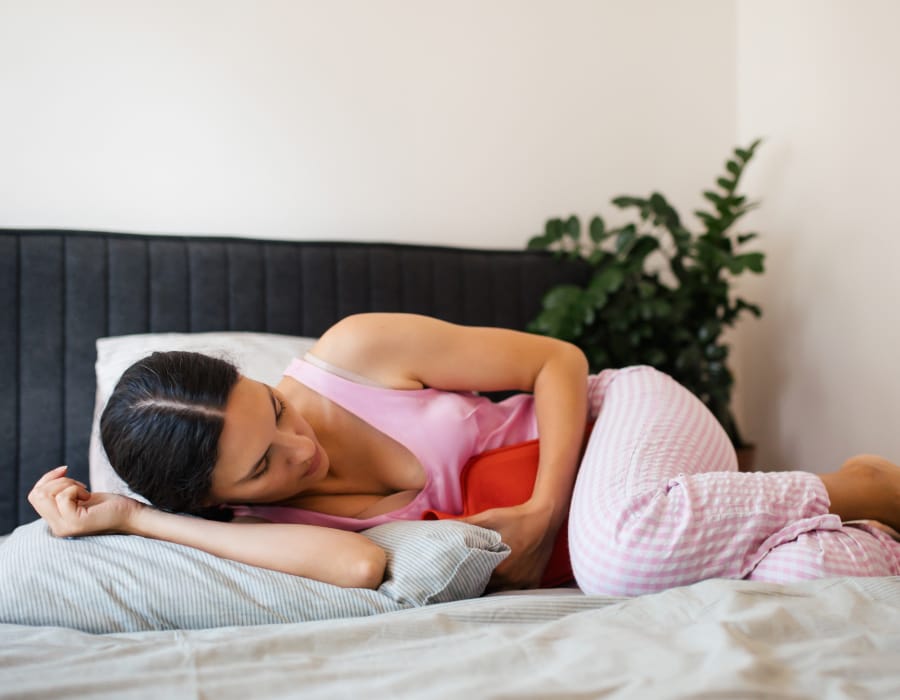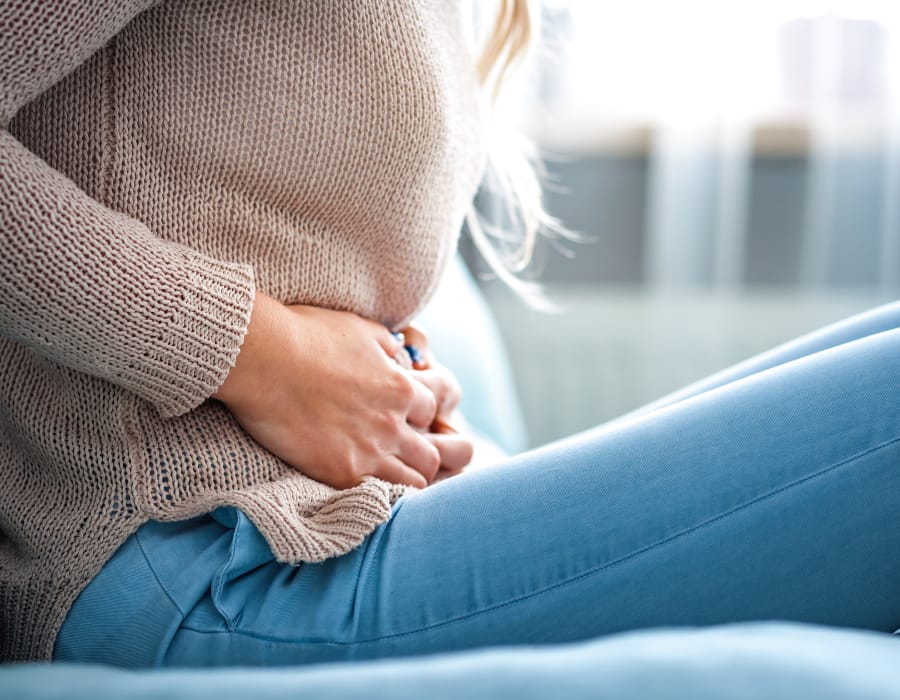Period pain Perth
Everything you need to know about period pain and heavy bleeding

In a nutshell
Did you know that severe period pain is not considered normal? And did you know that a normal flow – over the course of your entire period – shouldn’t be more than 80 ml of blood? If your monthly cycle is disrupting your daily activities, because you’re in pain or seem to lose a lot of blood, it’s worth making an appointment with a gynaecologist here at Perth Women’s Health.
Heavy periods Perth Women’s Health
What are heavy periods?
Periods differ for everyone, but it’s key to know when your bleeding is heavier or more painful than usual.
Heavy periods, or menorrhagia, are medically defined as losing more than 80 ml of blood per cycle (which is equivalent to about 16 teaspoons). If your period lasts longer than 7 days, this too is considered heavy menstrual bleeding.
“If you notice large clots in your period blood or if you need to use double protection to manage your flow, it’s a good idea to book an appointment. You also shouldn’t be in pain when you are menstruating.”

Your periods may be heavy or painful because of an underlying condition. If ignored, this could lead to health complications or even fertility issues.
Let’s take a look at what the potential causes may be.

Causes of heavy periods
Why do I have heavy periods?
There are several potential causes for heavy periods, and during your consultation at Perth Women’s Health, we’ll take a detailed look at your individual circumstances to determine what might be happening.
“It’s important to mention that many women with heavy menstrual bleeding don’t have an underlying health issue. In such cases, the heavy bleeding might be linked to hormonal or chemical imbalances within the endometrium.”

However, when hormonal imbalances are not at play, we must consider other medical conditions that can cause heavy or painful periods:
Endometriosis
Endometriosis occurs when tissue resembling the lining of your uterus begins to grow outside of it. This may lead to heavier, painful periods. Endometriosis is a common condition with over 10% of women affected.
Adenomyosis
When the inner lining of the uterus begins to grow within its muscular walls, it increases the size of the uterus. This creates a larger surface for blood to shed from, which can lead to heavier periods. This condition also often increases the intensity of period cramps due to higher levels of prostaglandins.
PCOS
Polycystic ovary syndrome is caused by hormonal imbalances which can disrupt the regularity of periods and sometimes cause heavier bleeding.
Fibroids
These benign tumours in the uterus can alter the uterine lining, increasing the area from which blood is shed during your period, which can result in heavier bleeding.
Polyps
Polyps are benign growths in the lining of the uterus and are a common cause of heavy periods.
Puberty or perimenopause
Hormonal fluctuations at the beginning or end of the reproductive years can cause heavy bleeding due to infrequent ovulation and hormonal imbalances.
Inherited conditions
Bleeding disorders like Von Willebrand disease can affect the blood’s ability to clot and therefore lead to heavier menstrual bleeding.
Post-childbirth changes
The uterus can be larger post-childbirth, especially if you’re over 40, meaning there’s a greater surface area from which blood can shed.
“It’s not just the physical symptoms that matter; the social and emotional challenges that come with heavy periods are real and can significantly affect how you live your life.”


Managing heavy periods Perth Women’s Health
How are heavy periods managed and treated?
When it comes to managing heavy bleeding, our first step is to exclude any serious conditions, as mentioned earlier. After that, we explore a range of treatment options that suit your unique situation.
Treatment options for heavy periods may include:
Iron supplements: To address any resultant anaemia and improve the oxygen-carrying capacity of your blood. It is important, however, to have iron levels tested before starting supplements, as excess iron can be harmful.
Progesterone: This hormone can help stabilise the lining of the uterus, potentially treating problematic bleeding.
Tranexamic/mefenamic acid: These medications can reduce blood loss by promoting clotting within the blood vessels of the uterus.
Contraceptive pill: This can regulate the menstrual cycle and often results in a lighter period.
Hormonal intrauterine devices (IUDs): Devices like the Mirena can significantly lighten or stop periods altogether.
Endometrial ablation: A procedure that destroys the lining of your uterus to reduce or stop menstrual flow.
Hysterectomy: The surgical removal of the uterus, a definitive solution for heavy periods but one that requires careful consideration regarding future fertility. Hysterectomy is considered a major surgery, not always the ideal choice. It should be chosen when other treatment options are not effective or not possible.
Remember, the right approach for one woman may not be the same for another. At Perth Women’s Health, we pride ourselves on tailoring our care to suit the individual needs of our patients, ensuring you receive the most appropriate treatment options.
Heavy periods in teenagers
Heavy and prolonged periods can be challenging for young girls when their period starts.
It’s normal that this can impact their daily life. If you are a teenager or a parent reading this, we encourage you to reach out. Discussing menstrual health is crucial and can be the first step towards finding relief and overcoming the stigma associated with periods.
Heavy periods for those over 40
Women in their 40s or those who have had multiple pregnancies may experience changes in the uterus that lead to heavier bleeding. We understand that large doses of hormones or surgery like a hysterectomy may not be the preferred or suitable option for everyone. Finding the right balance and providing optimal care for each woman is our goal.
Period pain Perth
Perth Women’s Health for heavy or painful periods
At Perth Women’s Health, we understand that dealing with heavy or painful periods can be challenging. We offer prompt appointments without delay, always taking into account your unique circumstances.
We take the time to explain treatment options in detail, ensuring you are well-informed and comfortable with your choices.
Your wellbeing and comfort are our top priorities.

Women’s health clinic near me
Find us here
Mon-Fri: 8am – 4pm
Level 2, Suite 64-66
100 Murdoch Drive
Murdoch WA 6150
Perth Women’s Health Blog
Latest articles on women’s health
